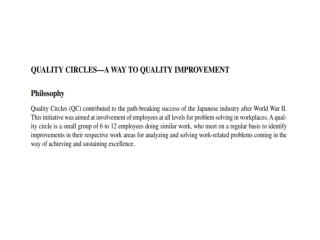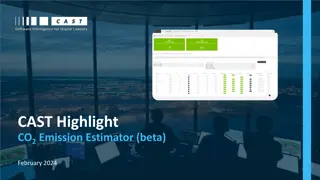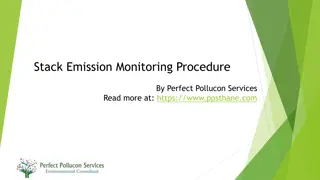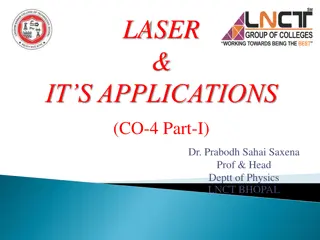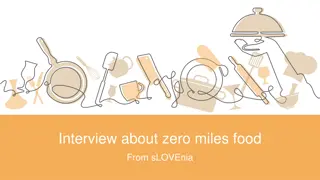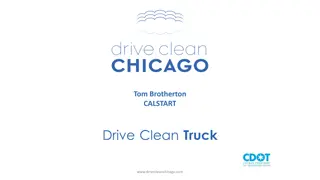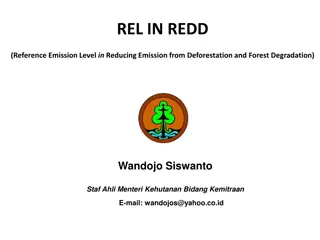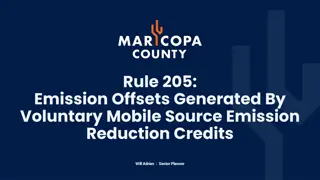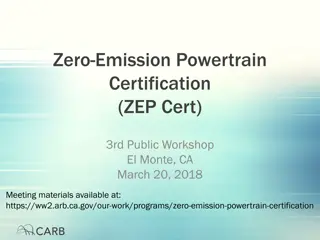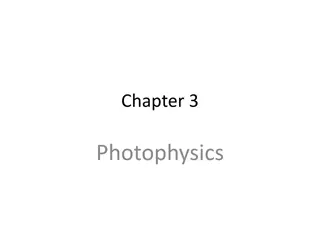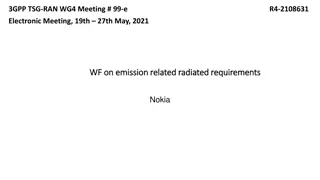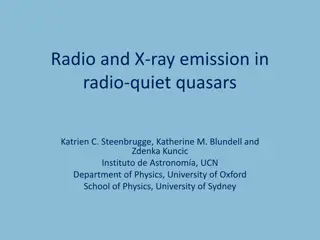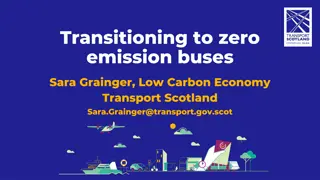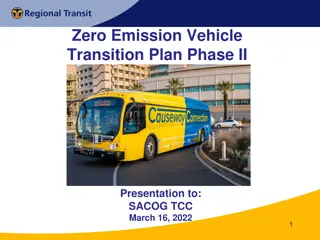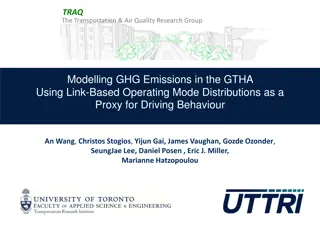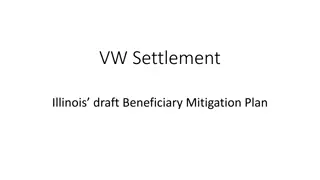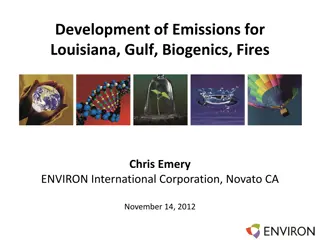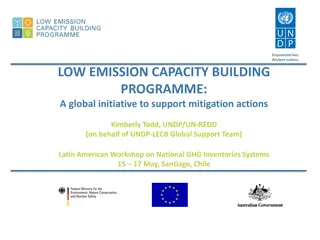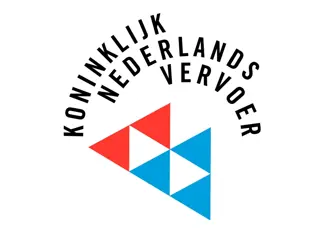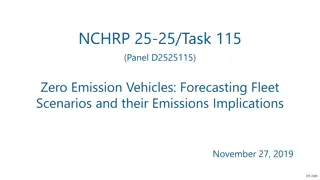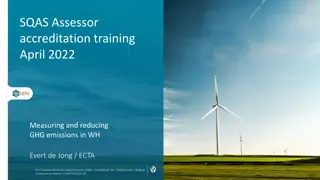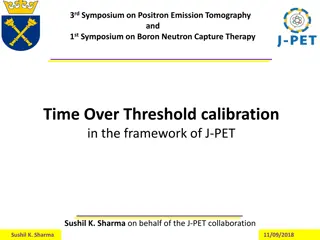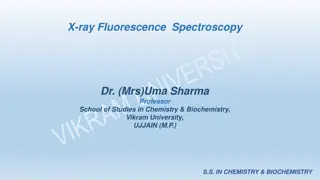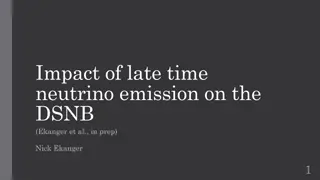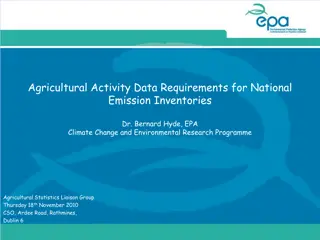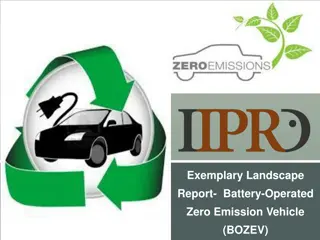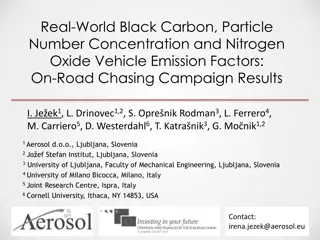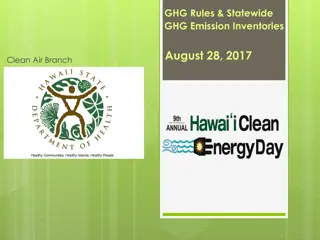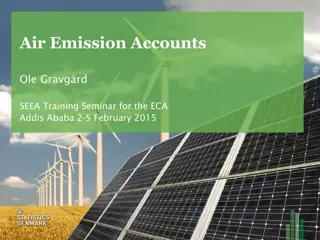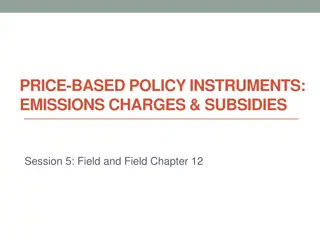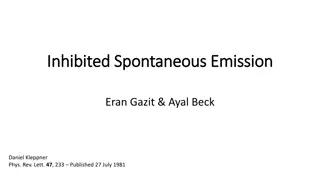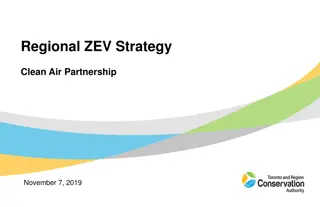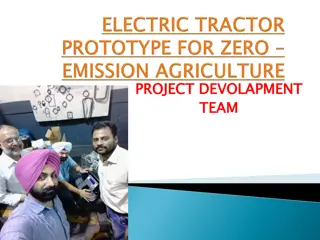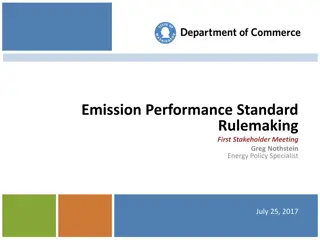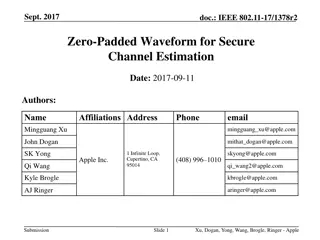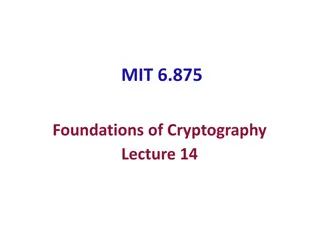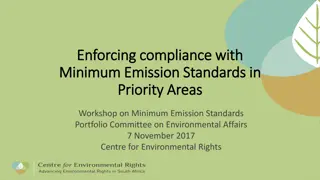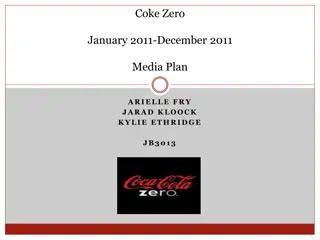Zero Defects Philosophy in Quality Management
Zero Defects Philosophy is a key principle in Total Quality Management, advocating for perfection in products and processes by eliminating defects completely. Philip Crosby popularized this concept, emphasizing that defects are never acceptable. Key concepts include "Quality is Free" and "Do It Righ
0 views • 19 slides
Developing the CAST Highlight CO2 Emission Estimator (Beta) - February 2024
CAST Research Labs studied the impact of removing green deficiencies detected by CAST Highlight on CO2 emissions and energy consumption in custom software applications. The study led to a formula for estimating potential CO2 emission reductions, which was integrated into the new CAST Highlight CO2 E
0 views • 11 slides
Efficient Stack Emission Monitoring Procedure for Air Quality Control
Stack emission monitoring is crucial for industries to assess and reduce pollutants in exhaust air. This procedure involves tasks like measurement, testing, and analysis of flue gases. Sampling sites are selected strategically for accurate readings, and molecular weight and gas velocity are determin
1 views • 11 slides
Understanding Laser Technology: Principles, Applications, and Einstein's Coefficients
Exploring the fascinating world of lasers, this content delves into the principles governing laser technology, including the concept of stimulated emission by Einstein. It covers the characteristics of lasers, different types, and the significant contributions of pioneers in the field. The explanati
0 views • 14 slides
Insights on Zero Miles Food Practices in Slovenia
This interview delves into the awareness and preferences of individuals in Slovenia regarding zero miles food. Topics covered include knowledge about zero miles food, willingness to purchase, preference over ecological food, recent shopping behavior, and awareness of sustainable consequences related
0 views • 10 slides
Drive Clean Truck Incentive Program Details
Drive Clean Truck initiative in Chicago offers point-of-sale incentives to move fleets towards zero and low-emission vehicles, focusing on Class 2 to Class 8 trucks and buses. The program, funded by the Chicago Department of Transportation and administered by CALSTART, issued $11.3M for 288 trucks a
0 views • 9 slides
Understanding Reference Emission Level in REDD
REDD (Reducing Emission from Deforestation and Forest Degradation) involves a system for producing carbon credits, including steps like setting baseline emission levels, devising deforestation reduction strategies, monitoring changes, managing carbon credit sales, and distributing income. Organizati
0 views • 10 slides
Compliance Guide for Rule 205: Emission Offsets & Mobile Source Credits
Rule 205 outlines the process for generating emission offsets through voluntary mobile source emission reduction credits in Maricopa County. The rule-making process, state implementation plan submission, and permit conditions related to Rule 205 are discussed. The preparation for compliance includes
0 views • 7 slides
Understanding the Principle and Working of Semiconductor Lasers
Semiconductor lasers operate through absorption, spontaneous emission, and stimulated emission processes. Absorption of radiation causes electrons to jump to higher energy levels, leading to light emission. Spontaneous emission is when excited electrons return to ground state by emitting photons, wh
3 views • 17 slides
Zero-Emission Powertrain Certification Workshop Highlights
Workshop materials and agenda from the Zero-Emission Powertrain Certification 3rd Public Workshop held in El Monte, CA on March 20, 2018, discussing the ZEP Cert framework, applicability, testing, monitoring requirements, and more. The workshop aimed to accelerate the adoption of zero-emission techn
1 views • 24 slides
Understanding Photophysics: Emission and Luminescence Processes
Photophysics explores the emission and loss processes in luminescent phenomena, named based on the excitation mode of energy-rich species. Different types of luminescence include fluorescence, phosphorescence, and chemiluminescence. Bioluminescence in nature, such as in fireflies and dinoflagellates
0 views • 20 slides
Emission Requirements Discussion at 3GPP TSG-RAN-WG4 Meeting #99-e
Discussion at the 3GPP TSG-RAN-WG4 Meeting #99-e focused on emission-related radiated requirements for DL and UL in relation to adjacent channel protection in NR specifications. Various options and candidates for defining ACLR were explored, along with considerations for spurious emissions and OBUE
1 views • 5 slides
Insights into Radio and X-ray Emission in Radio-Quiet Quasars
Radio galaxies are categorized as radio-loud or radio-quiet based on the presence of jets and lobes. Unlike radio-loud quasars, the nuclear radio emission in radio-quiet quasars does not originate from large-scale jets. Possible explanations include broad absorption lines, magnetically accelerated e
0 views • 15 slides
Towards Sustainable Transport: Decarbonizing Vehicles and Infrastructure in Scotland
Transitioning to zero-emission buses in Scotland is a crucial step towards achieving a sustainable future. The focus is not just on electrification but also on decarbonizing aviation, railways, and road vehicles. The whole system approach emphasizes the importance of fleets in driving virtuous inves
0 views • 7 slides
Zero Emission Vehicle Transition Plan Phase II Presentation to SACOG TCC
California Air Resources Board (CARB) mandated the transition to 100% zero-emission fleets by 2040 for all transit agencies, leading SACOG to roll out Zero Emission Bus (ZEB) programs. The ZEV Planning Phase II report details the introduction, garage concepts, ZEB transition, costs, and next steps i
0 views • 10 slides
Modelling GHG Emissions in Greater Toronto Area Using Link-Based Operating Mode Distributions
The Transportation & Air Quality Research Group's study focuses on generating a lifecycle emission inventory for transportation in the Greater Toronto Hamilton Area (GTHA). They aim to incorporate uncertainty in the emission inventory and quantify the impact of electric vehicles on total emissions.
0 views • 35 slides
Illinois Volkswagen Settlement Beneficiary Mitigation Plan Overview
The Illinois Volkswagen Settlement Beneficiary Mitigation Plan involves a $108 million investment to reduce NOx emissions by replacing old diesel engines with new diesel, alternative fuels, and electric options. It includes a vehicle recall and repair program, a Zero Emission Vehicle Investment Comm
0 views • 25 slides
Detailed Overview of Emissions Development in Louisiana
Emissions Processing System (EPS3) generates chemically speciated, gridded formats required by CAMx, with a focus on raw annual/ozone season county/parish-level emission inventory files and support data. Spatial and temporal profiles, along with cross-reference files, are essential for this work, co
1 views • 27 slides
Global Low Emission Capacity Building Programme Overview
The Low Emission Capacity Building Programme is a global initiative by UNDP aimed at enhancing capacities for designing and implementing Low Emission Development Strategies and national mitigation actions in various sectors. It includes components like GHG inventory management, NAMAs, LEDS, MRV, and
0 views • 12 slides
Insights into the Dutch Coach Industry and Low Emission Zones
Discover the Dutch coach industry landscape, including the market share of KNV members, emission regulations in low emission zones, and challenges faced by coach companies like Leo Ringelberg Touringcars. Explore how KNV is advocating for cleaner coaches and addressing restrictions in important tour
0 views • 17 slides
Zero Emission Vehicles: Forecasting Fleet Scenarios & Emissions Implications
This research project, conducted by Louis Berger U.S. Inc. & Sonoma Technology Inc., explores the implications of adopting zero emission vehicles through forecasting fleet scenarios and estimating emissions reductions. The study assesses the potential increase in zero emission vehicle population, em
0 views • 42 slides
Greenhouse Gas Emissions Management in Warehouse Operations
The SQAS Assessor accreditation training in April 2022 focused on measuring and reducing greenhouse gas emissions in warehouse operations. The content covers emission questions, scope of emissions, energy consumption examples, disaggregation of emissions, emission intensity calculation, and strategi
0 views • 17 slides
Symposium on Positron Emission Tomography and Boron Neutron Capture Therapy Time-Over-Threshold Calibration in J-PET
The 3rd Symposium on Positron Emission Tomography and 1st Symposium on Boron Neutron Capture Therapy focused on Time-Over-Threshold calibration within the framework of J-PET. The event outlined experimental details, event selection, results, and key features of the Jagiellonian Positron Emission Tom
0 views • 35 slides
Applications and Importance of X-ray Fluorescence Spectroscopy in Analytical Chemistry
X-ray Fluorescence Spectroscopy (XRF) is a vital analytical technique used for qualitative and quantitative analysis of elements based on their X-ray emission characteristics. Dr. Uma Sharma, a Professor at Vikram University, details various X-ray analytical methods, including X-ray emission, Auger
0 views • 21 slides
Evaluation of FME Zero Emission Neighbourhoods in Smart Cities
The mid-term evaluation process of FME Zero Emission Neighbourhoods in Smart Cities involves self-evaluation, partner evaluation, and panel evaluation. The procedure includes scientific review, evaluation by scholars, and innovation assessment. Key documents like self-reports, progress reports, and
1 views • 20 slides
Late-Time Neutrino Emission Impact on DSNB Study
Explore the implications of late-time neutrino emission on the Diffuse Supernova Neutrino Background (DSNB) through core collapse supernovae simulations. The research delves into the dynamics of neutrino emission in different phases of supernova events and its relevance to understanding the DSNB.
0 views • 15 slides
Agricultural Emission Inventory Data Reporting Requirements
This presentation discusses the data requirements for national emission inventories in the agricultural sector, covering greenhouse gas inventories, air pollutant inventories, National Inventory Reports, Large Combustion Plant Directive, National Emission Ceilings Directive, livestock emissions, and
0 views • 13 slides
Advancements in Battery-Operated Zero Emission Vehicles (BOZEV)
The report delves into the landscape of Battery-Operated Zero Emission Vehicles (BOZEV), highlighting their eco-friendly nature, cost-effectiveness, and reduced maintenance. It compares BOZEVs with fuel-propelled vehicles, emphasizing the benefits including zero emissions, low noise pollution, and s
0 views • 41 slides
Real-World Black Carbon & Nitrogen Oxide Vehicle Emission Factors Study
This study presents real-world data on black carbon (BC) and nitrogen oxide (NO) vehicle emission factors gathered through on-road chasing campaigns. The research explores the influence of dilution and vehicle performance on emission factor calculations, with a focus on measuring emissions from vehi
0 views • 13 slides
Hawaii Statewide Greenhouse Gas Emission Rules Overview
The Hawaii Statewide Greenhouse Gas (GHG) Emission Rules implemented by Act 234 in 2007 aim to limit statewide GHG emissions to 1990 levels by 2020. The rules include setting emission caps for stationary sources, conducting annual evaluations to track progress, and reporting GHG inventories regularl
0 views • 9 slides
Understanding Air Emission Accounts and Bridge Tables
Flows of air emissions, including gaseous and particulate substances released into the atmosphere, are recorded in Air Emission Accounts following specific guidelines and considerations. Bridge tables play a crucial role in reconciling differences between national economy totals and emission invento
0 views • 18 slides
Understanding Emission Charges for Environmental Policy
Explore the concept of emission charges as a policy instrument, where firms pay charges for every unit of effluent discharged to reduce emissions. The regulator sets the price to achieve efficient emission levels. Learn about setting charges in competitive environments, total abatement costs, and th
0 views • 18 slides
Exploring Inhibited Spontaneous Emission in Physics
The study delves into inhibited spontaneous emission in physics, focusing on the phenomena, experimental setups, and effects like the Purcell effect. It discusses using waveguides and Rydberg atoms for this purpose, as well as the density of modes and states in free space and cavity configurations.
0 views • 16 slides
Regional Zero Emission Vehicle Strategy for Clean Air Partnership
Exploring the importance of a Regional Zero Emission Vehicle (ZEV) Strategy for municipalities to mitigate infrastructure costs, reduce transportation fuel expenses, enhance economic development, and address environmental concerns. The strategy aims to promote the uptake of electric vehicles to comb
0 views • 24 slides
Electric Tractor Prototype for Zero Emission Agriculture Development
This project focuses on the development of an electric tractor prototype for zero emission agriculture. The prototype features include no air or sound pollution, low maintenance costs, high efficiency, and various applications such as spraying, haulage, rotavation, and more. The lead-acid and lithiu
0 views • 12 slides
Washington State Emission Performance Standard Rulemaking Stakeholder Meeting Overview
This document provides detailed insights into the first stakeholder meeting regarding the Emission Performance Standard Rulemaking in Washington State. It covers key agenda items, reviews of RCW 80.80 GHG Emission Performance Standard, definitions related to CCCT and baseload electric generation, an
0 views • 19 slides
Zero-Padded Waveform for Secure Channel Estimation in IEEE 802.11-17
Security is a vital aspect in IEEE 802.11az, particularly in secure ranging applications. This document introduces zero-padded waveforms to protect channel estimation against attackers aiming to manipulate the range of STAs. The proposal outlines requirements, including the need to eliminate predict
0 views • 12 slides
Zero-Knowledge Proofs in Cryptography
Exploring zero-knowledge proofs in cryptography, this content delves into interactive protocols, perfect zero-knowledge definitions, and the QR protocol's honest verifier and malicious verifier zero-knowledge theorems. It discusses how simulators work to maintain zero-knowledge properties and the si
0 views • 37 slides
Enforcing Compliance with Minimum Emission Standards in Priority Areas Overview
Workshop on the enforcement of minimum emission standards in priority areas, focusing on compliance requirements, challenges faced by key industry players like Eskom and Sasol, and the process of seeking postponements for meeting standards. Detailed insights into the regulatory framework, stakeholde
0 views • 20 slides
Coke Zero Media Plan 2011: Marketing Strategy & Analysis
Coke Zero, a popular zero-calorie soda by Coca-Cola, targets middle to upper-class consumers aged 21-34 living in metro areas. The media plan for 2011 focuses on enhancing brand awareness and market share among this demographic through strategic media objectives and tactics. With a budget of $35 mil
0 views • 24 slides
